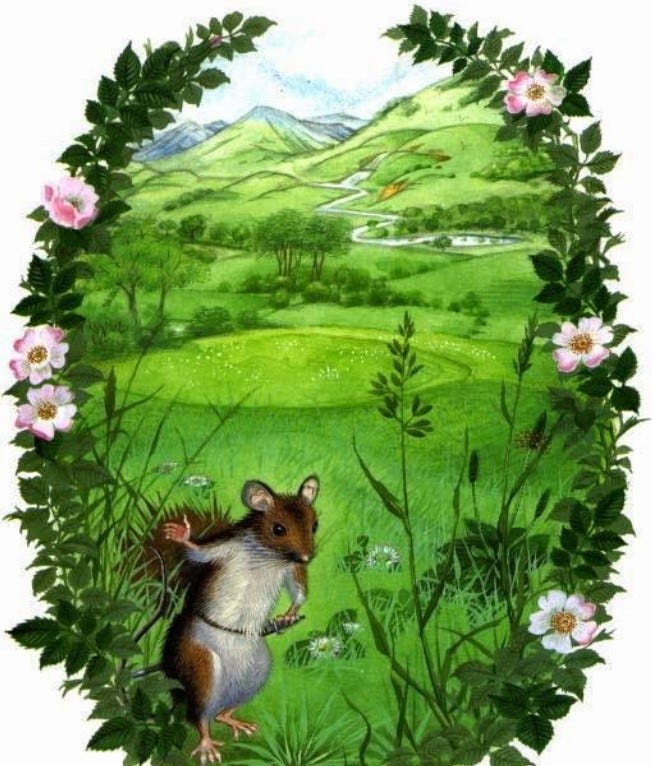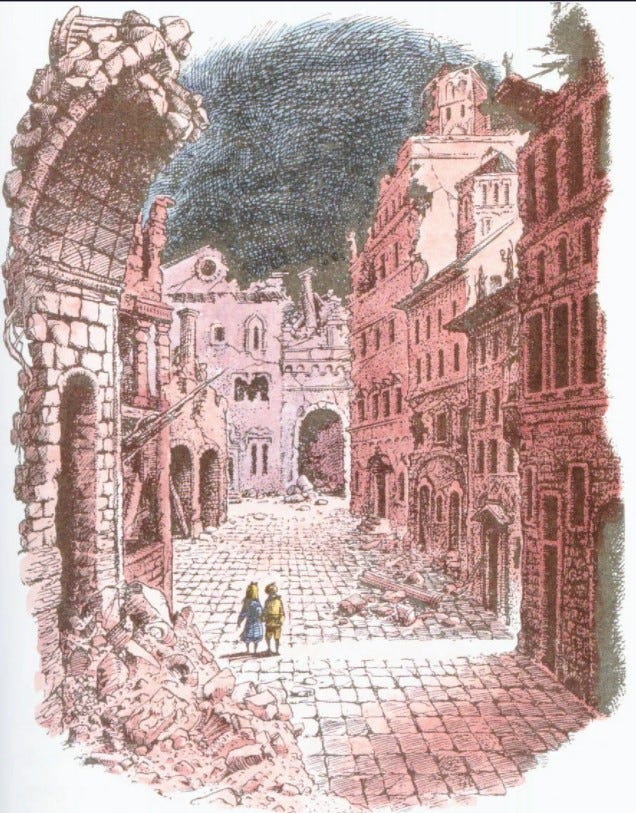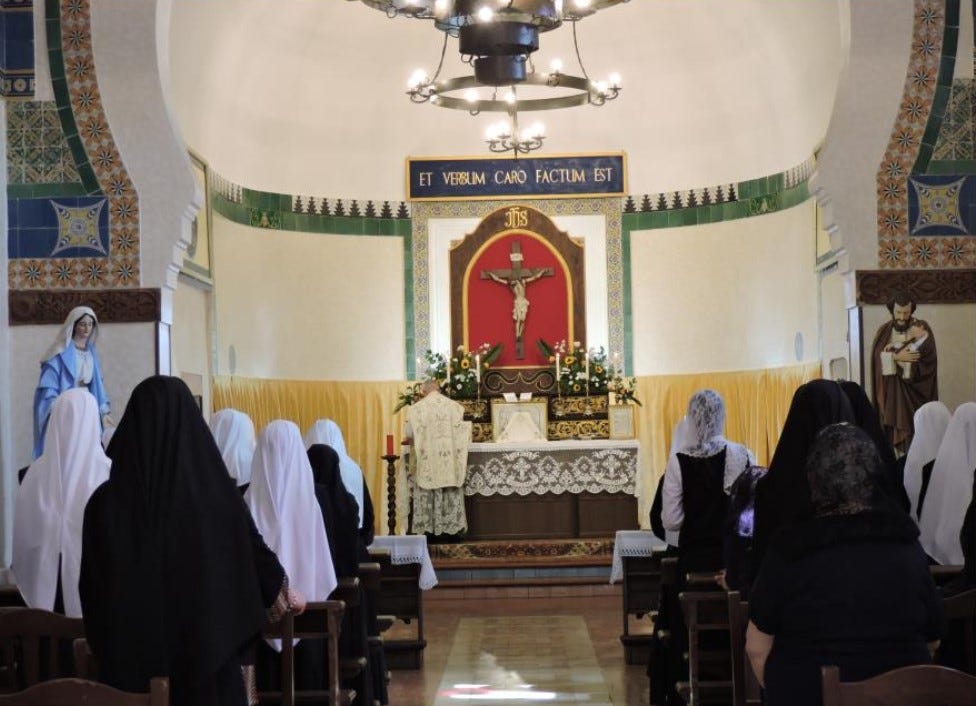Why iconography?
The window to heaven: higher up and further in
People who have read me for a long time know that the World has never held much of an allure. I’ve spent my life on a search for the metaphorical Door to Narnia, a way to get away from it.
I talked a lot, when I moved in 2014 to Norcia and became a Benedictine Oblate, about having found at least the threshold of that door. From Norcia, I could at least see the Enchanted Realm.
And when the earthquake came, it was a loss I could hardly bear. And it left me, I thought, with nothing I wanted in this life.
~
~
I found meaning but it turned out to be a path, not a place
When I was at a low point during the lockdowns, I was listening to Jordan Peterson a lot, to try to cheer myself up and give myself some hope and reason to go forward. He talks a lot about "meaning" and seeking meaning above seeking "happiness." And he's right. Meaning is something transcendent that you can spend a lifetime pursuing and living in, however you happen to be feeling. Happiness is something ephemeral and passing that you can get from a plate of spaghetti.
Writers have talked a long time - since there have been writers, I guess - about "Man's search for meaning". And I admit that is what I've been doing my whole life.
I found that meaning, or at least the doorway into it, in the Catholic Faith. Around 1997, I walked out of the grey and lifeless, crumbling dead world of secular Modernity, where anger and nihilism was the brutish foundation of all behaviour - get whatever you can - and into this previously unknown world of green and golden enchantment. I felt like Lucy coming out of the Wardrobe.
But whenever I stepped out it wasn't England in 1944, for me.
It was Charn.
Whenever I looked away from the indescribable glow and warmth and life of the Faith I'd discovered, the world I saw behind me was utterly lifeless, utterly hopeless; a nothing-world with nothing in it I could want.
And that was difficult.
~
~
Why I can't give up.
After I’d been away from the deathly City a long time, and had lived in Norcia’s bliss for a few years, and had tried to learn to live again in the World Outside, I started to accept that there was no way back. I had sat and waited, doing very close to nothing for three years, to go home. But it was finally clear that door was closed forever and I needed to think about what else I was going to do and where I was going to do it.
In early October 2019, I went down to Rome to attend a series of conferences to which nearly every person I'd ever worked with in my writing work would be coming. (There was a Thing going on at the Vatican that everyone was in an uproar about.) So I went down to see if there was some way I could fit back in to that world. It had been a few years since the earthquake had driven me out of Norcia, and I'd been left with little sense of purpose since then.
But when I got there, though little else was clear, one thing was inescapable: this was no longer for me. Not only did that world - of activism and politics and journalism - have no place for me in it, I had no place for it in me. I looked at it, all this business of conferences and articles and demonstrations and political shop talk, and saw it was just the Dead World again. I couldn't go back to it. In two years of life in Norcia, on the threshold of the Green World, I'd lost my immunity to the toxic dust of Charn.
After I got home, I knew I wasn't going back. So the question was, what then? I really didn't know. For some years while in Rome I had studied classical academic drawing, but never had the confidence to think I could turn it into my life’s work. And at that time, I was still deeply immersed in my other work. But then came cancer and chemotherapy, and a side effect seemed to be that I’d lost my taste for The World, once and forever.
On a whim, while I was there in the City, I'd taken down the number of a woman who was teaching a class in Byzantine iconography, which I wasn't really that interested in, to be honest. Too abstract for my taste.
But lacking any other answers...
~
If not a door, then at least a window to gaze through
Why icons? A friend and fellow Latin Catholic asked this the other day. We Westerners aren't culturally accustomed to the abstracted forms of Byzantine art, and we often find them static and incomprehensible. We have forgotten and need to re-learn the visual language of iconography, where our Orthodox and Eastern Catholic friends know it from birth.
But in the time I've studied and painted, I've started to learn it and discovered something the Latins have forgotten, that this is the language of Heaven in visual form. We've become deaf to it. But it is possible to start to hear it, and I think that is my aim in writing about it, and the related things I’m learning. The thing I’ve discovered and am discovering is too good to keep to myself.
In the last 18 or so months - my period of slowly increasing dedication to this art form has almost exactly coincided with the Covid catastrophe - it has become something like second nature. Slowly my world has oriented itself to this. Whether I can "live" on it - whether, just at the moment, I can generate enough income - seems a secondary consideration. This work is, for good or ill and no matter what comes, what I "do" now.
This art form is a window into the green and golden world of eternal life. I'd rather sit and gaze into it and be poor and struggling, than be "successful" by the Dead World's standards.
And despite my own cacophony of insecurities, it’s not actually going that badly. I’ve completed 7 commissions, plus a few other works, in that 18 months. And people seem to like them. I have a constant stream of people asking for them. Right now I’ve got three clients lined up in the queue, with three more “on the hook”.
There’s no question that it is possible to do this in a way that can make me independent - there are plenty of master iconographers out there who do - but it is going to take some time. 18 months is a short time to advance this far, but I’ve got a way to go before getting to the point where I can push the commissions close enough together in time to keep up with expenses. A matter of building up skills, and reducing time spent fixing mistakes. Practice, in other words. And study.
~
~
Until I started learning this heavenly language, the only thing that had ever come close was the Liturgy, the Chant. The liturgy, particularly the Divine Office, is the first love of my spiritual life, and the first time I found something that could, at least for a moment, pick me up and take me away from the dead world of toxic dust. And that is why I gravitated to monastic life, and why I became an Oblate and moved to Norcia.
And this is why I believe my vocation is intimately connected with this work. It’s a job - at least potentially - but it’s one unlike any other monetary work.
~
Time to move
If you'd found the Door to Narnia, wouldn't you go through?What if you knew a secret formula, a chant or an incantation, a method of getting to Narnia, or even to Aslan's own country? Would you use it? What if the only way to make the magic work, the true magic, was to make an immense personal sacrifice? Would you do it then? What if it required the sacrifice of everything you have, and took the rest of your life? And you had to give up everything and go live in a completely different way, in a different place... worth it?
What if there were a little stone house, a kind of gatehouse, where on one side of the house you came through the door in this world, and across the room there is a little wooden door, and every day, eight times a day, starting very early in the morning, you had been asked to open the door and sit in the doorway and look through, and as long as you have sung the proper song in the proper language, that doorway would show you the world that you have longed all your life to go to, would you do that?
All this being said, the time seems to have arrived to take another step.
It looked as though the Italian government was looking at further restrictions on travel and activity, at least for the unvacks’d. Because of Covid I’d stayed in my little refugee camp near Perugia a year longer than originally intended. But I was glad of that, because this was a good place to land. I’d been able to catch my breath, and do some thinking, as well as quite a bit of gardening, and to find and get at least a good start on a new path.
My Twitter and Facebook followers will know that I recently took a trip down to the beautiful little medieval Umbrian hill town of Narni, and was looking for, and thought I had found, a new flat there. The reason I went was some news that also came at a crucial turning point.
I’ve been friendly with these sisters, the Consoling Sisters of the Sacred Heart, for some time. They’re a local diocesan order of active/contemplative sisters founded in the early 1960s and for some years under the care of the Society of St. Pius X.
I knew they had just received at least a dozen new vocations from the US, and were looking at buying a convent in a little village about 40 minutes away from their motherhouse.
In early July I received a notice that they had succeeded in purchasing a property, but that instead of the obscure little village in the hills, it was a much larger place in the centre of the beautiful old city of Narni. This, at least, I felt very strongly was a clear sign that the moment had come.
I have spent the last few years casting up and down the length of Italy, and often even further away, for a place to live where the Mass and Sacramental life would be possible, but at the same time that I could afford while continuing to do this work. The puzzle seemed insoluble. Italy is not a place where the traditional Catholic movement has made any strides. Indeed, the recent attack by the Vatican on the ancient liturgy is thought to have been at the behest and for the benefit of the Italian bishops whose hostility to the Old Rite and the old religion that goes with it is legendary. If you can afford to (and want to) live in a large urban centre like Rome, Florence or Milan, you have more choices, but such places are not for me.
So, I kept my eyes and mind open to possibilities, but in over four years, the choices remained very sparse. When I heard that the sisters were buying a property, I prayed that it would be somewhere it would be possible to move. A convent, served by the (thus far) untouchable-by-Rome SSPX, would mean daily Mass and a ready-made community. It would mean, at the very least, the end of my long period of isolation.
You can imagine my feelings when they announced they had bought “Il Minareto,” an old Capuchin convent, built about 1600, in such a beautiful, central and accessible town.
I went down with a friend in August, and thought I had found the right place. A two-bedroom flat, about a 20 minute walk from the convent. Alas, when I tried last week to secure the place, the realtor told me the lady who owned it had changed her mind about renting.
But I still believe this is the way forward. Rentals are few in Narni, and another trip is probably in order. But the long term hope - now that it’s possible even to have such a thing - is to move and to paint, to continue to study and finally to teach and organise classes.
I’ve had a dream for a long time of something like this, a convent to be attached to, to live close to that could allow me in charity to organise my life around the liturgy once again, and a chance to pursue this growing vocational aspiration.
This video of some Orthodox nuns in Serbia (that AFP for some reason won’t let me post) who have created a monastic iconography studio has been an inspiration for some years. Couldn’t we do something like this in the Latin Catholic world?
~
Thanks for reading
I could really use some help. Painting commissions and donations from my writing are for now my only source of income. If you would like to be a patron of the arts, or just a pal, you can donate through my Ko-fi support page here. (And don’t forget to click “follow” to get posts about my art work efforts.) Or you can donate directly, or set up a recurring donation, through PayPalMe, here.
Don’t forget that the subscriptions to this site are all free for now, so share it around if you know someone who might enjoy them. If you join, you’ll get each post directly to your email, so you don’t even have to click anything. And drop us a comment, join the conversation.







Yes. As a child I wished so hard that Narnia were "real". As a teenager I was dispirited to realize (as I thought) that "reality" meant this boring, ugly, profane and disturbing modern world. As an adult, I've been made boundlessly glad to learn that the modern world is an illusion, while that which Narnia symbolizes is more real than anything I can see with my waking eyes, touch, taste, hear or feel.....
"What if the only way to make the magic work, the true magic, was to make an immense personal sacrifice? Would you do it then? What if it required the sacrifice of everything you have, and took the rest of your life? And you had to give up everything and go live in a completely different way, in a different place... worth it?"
Sign me up. Without it, nothing is worth living for anyway.
"every day, eight times a day, starting very early in the morning, you had been asked to open the door and sit in the doorway and look through, and as long as you have sung the proper song in the proper language, that doorway would show you the world that you have longed all your life to go to, would you do that?"
The monastic life in a nutshell--and they do it not just to delight in looking, but to keep alive the knowledge of the way to get to that country, and help for everyone else to get there too. It's the realest kind of real. I'm still stunned and delighted to realize that we are unkowingly, living within reach of glories and mysteries that surpass anything in the best of myths and fairytales.
I'm happy for you. I hope the move works out. Umbria is beautiful.